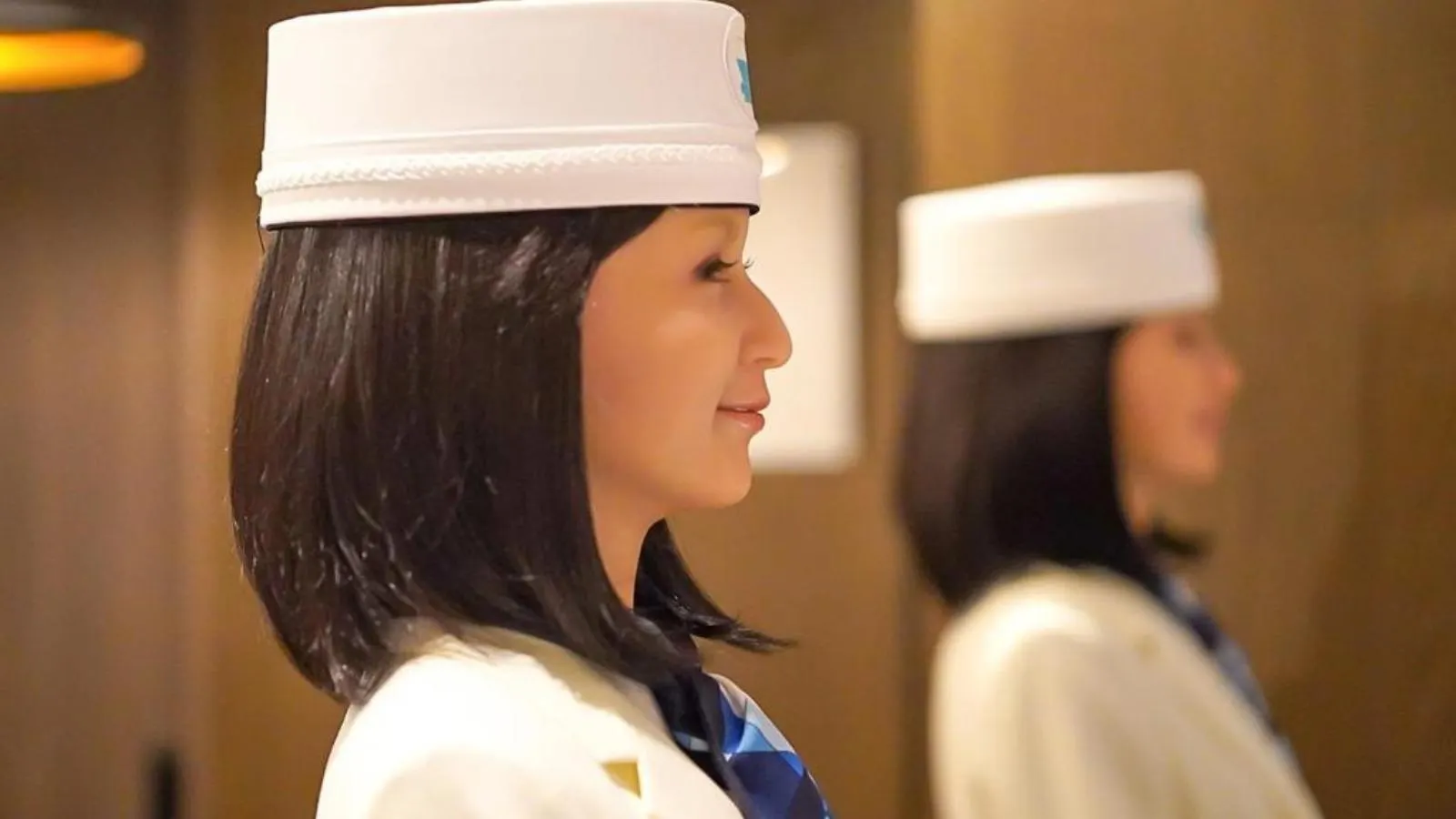In brief
- Hotels around the world are increasingly utilizing humanoid robots to check guests in, answer questions, and reduce staffing costs.
- While some travelers embrace the high-tech experience, others feel uneasy, especially when robots appear too human.
- Despite technical glitches and guest complaints, the hospitality robot market is booming, with an expected value of surpassing $2 billion by 2030.
A TikTok video went viral on Monday, showing a woman laughing nervously as she backs away from a humanoid robot at Japan’s Henn-na Hotel.
“Don’t look at me,” she said, as the machine watched her. The scene underscores growing fears that robots are replacing humans in the workplace.
The awkward check-in has racked up hundreds of thousands of views and tapped into a deeper fear: robots that are a little too human.
“They looked eerily similar to humans and are honestly very creepy,” one traveler said in a shared video. “This is freaky,” another said.
The guest’s discomfort reflects a trend in human-robot interaction, known as the “uncanny valley,” the eerie feeling that arises when machines look and behave almost like people, but not quite enough.
Robot operated hotel in Japan. They already living in the future. pic.twitter.com/B66M3NLnq0
— Johnny (@j00ny369T) June 30, 2025
As UC Berkeley Industrial Engineering Professor Ken Goldberg once told Decrypt, “I want a robot to look like a robot—it can maybe do some things, but I don't want to confuse it with a real person.”
From Tokyo to Las Vegas, hotels are experimenting with machines to greet guests, answer questions, serve food, and trim labor costs.
While some travelers enjoy the futuristic novelty, others are unsettled by blinking eyes, synthetic smiles, and eerily lifelike gestures.
A July 2023 report by Boutique Hotelier said 61% of hotel guests had positive reactions to service robots, while 28.5% expressed fear when approached by a robot server.
In Japan, the Henn-na Hotel, also known as the “Strange Hotel,” has led the charge in adopting robotic staff. Opened in Nagasaki in 2015, it once boasted more than 240 robots and a minimal staff of humans.
Today, guests can still find humanoid androids behind check-in counters at the chain’s locations in Ginza, Hamamatsucho, Asakusabashi, Akasaka, and Haneda.
While the Henn-na Hotel drew headlines when it opened, problems soon emerged. By 2019, the hotel had retired more than half of its robotic staff due to technical glitches and guest complaints.
Based on traveler reviews, people love it—they describe interacting with the ‘staff’ as fun and rate the hotel overall highly," a spokesperson for Hotels.com told Decrypt. "The hotel has found a memorable way to add a little novelty and delight to the check-in experience, which seems to go over well with guests."
Robots rise
Despite mixed reactions, the rollout of robots in the hospitality industry is accelerating.
A recent report from Research and Markets projects the global hospitality robot market, including check-in, delivery, and cleaning bots, to grow from $648.2 million in 2024 to $2.2 billion by 2030, at a compound annual growth rate of 21.5%.
The surge is driven by post-COVID demand for contactless services, rising labor costs, and greater consumer acceptance of robotic staff.
Other major hotel chains that feature robot servers include Marriott, Hilton, IHG, Wyndham, Aloft, Crowne Plaza, and Renaissance, with robots delivering room service, amenities, and food to guest rooms.
In 2017, a 4-foot-tall robot named Pepper was introduced at the Mandarin Oriental Las Vegas as a “technical ambassador.”
After the hotel was sold and rebranded as the Waldorf Astoria Las Vegas, Pepper stuck around—greeting guests in the lobby, answering questions, and occasionally dancing.
“She was good,” a Waldorf Astoria representative told Decrypt. “She helped with lines at our front desk and entertained guests.” But Pepper was eventually retired, possibly after being damaged by visitors. “Someone got rough with it,” the employee said, noting that parts had gone missing.
However, it remains to be seen how much humans will accept robots taking over the travel industry and removing the “human touch” the industry has been known for.
While humanoid robots grab attention with their lifelike appearances, experts say the real transformation is more subtle.
“When people talk about humanoid robot receptionists, they usually picture the physical kind, like androids at the front desk,” Wyatt Mayham, CEO of Northwest AI Consulting, said. “But the real shift in hospitality AI is happening behind the scenes. Most hotels aren't betting on robots to check you in. They're putting their money into automation that actually solves day-to-day problems.”
As Mayham explained, behind-the-scenes investment reflects a deeper trend reshaping the hospitality industry from within.
“Hotels are moving away from patchwork tools and toward integrated systems powered by AI,” he said. “The goal isn’t to replace people at the front desk, it’s to tighten operations and run leaner without losing service quality.”
For now, the robot receptionists are still employed at the Henn-na Hotel, but according to a recent report by travel website The Travel, the hotel’s staff is mostly human.
Edited by Sebastian Sinclair and Josh Quittner
Editor's note: Adds comment from Hotels.com spokesperson

